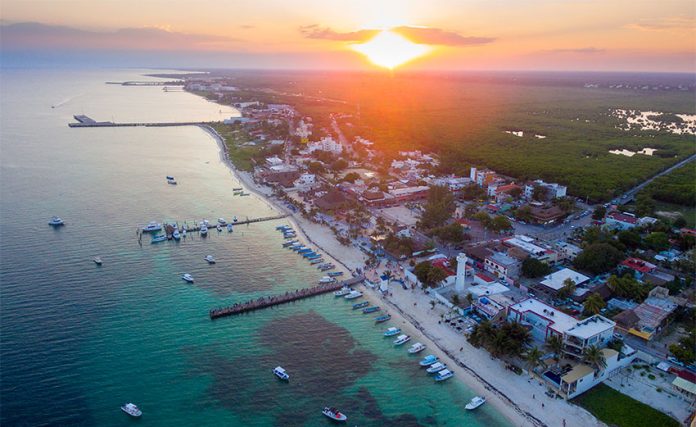A threat by hotel owners to protest the arrival of cruise ships in Puerto Morelos, Quintana Roo, with a human chain appears to have had its desired effect: permission for the ships to dock will reportedly not be granted.
“That’s what they’re telling me. I hope so,” Roberto Cintrón, president of the Hotel Association of Cancún and Puerto Morelos (AHCPM), told the newspaper El Heraldo de México.
Cintrón, former AHCPM president Carlos Gosselin, and the director of the Quintana Roo Association of Vacation Clubs, Patricia de la Peña, last week condemned the plan to allow cruise ships to dock in Puerto Morelos, a Caribbean coast resort town about halfway between Cancún and Playa del Carmen.
They told a press conference on October 3 that authorities made the decision without regard for the poor condition of reefs in the area, despite the lack of economic benefits the ships will bring and the negative impact they will have on the accommodation sector.
Cintrón said that if state and municipal authorities don’t stop the arrival of a cruise ship scheduled for November 2, a call will go out for a human chain to be formed on the Puerto Morelos pier to stop passengers from disembarking.
“We’re not going to accept it. If it’s necessary . . . we’ll form a [human] chain on the pier. We’re not going to allow [the arrival of cruise ships],” he said.
Alicia Ricalde, head of the Quintana Roo Port Administration authority, said in September that two cruise lines, France’s Le Pontant and Vidanta Cruises of Mexico, were planning to dock in Puerto Morelos as part of their “Maya Route” voyages, which also include stops in Yucatán, Campeche and Tabasco.
However, it now appears that the cruise lines will have to change their plans. El Heraldo de México, which reported on Wednesday that permits for the ships to dock wouldn’t be granted, said that authorities’ change of heart may have been due to the “barrage of criticism” from the hotel association and others.
Cintrón claimed that cruise ships in the northern part of Quintana Roo pose a threat to the hotel industry and the state’s economy as a whole.
The claim that passengers will generate economic benefits for ordinary locals is not true, he charged.
“It’s a lie. The tours are pre-booked . . . There is a maximum of two nights in a hotel of the same category as the ship, super luxury. There’s no economic spillover,” Cintrón said.
After highlighting the environmental problems that the arrival of cruise ships would cause, the hotel association chief took aim at Puerto Morelos Mayor Laura Fernández whose government had approved charging ship passengers the environmental sanitation tax of 25 pesos (US $1.30) upon disembarkation.
“They’re putting everything at risk for 25 pesos. It’s complete thoughtlessness,” Cintrón said, adding that Mexico is the only Caribbean coast country that doesn’t currently charge passengers to disembark.
The average charge around the world is US $50 in each destination where passengers leave the ship, he said.
Gosselin presented similar arguments.
“. . . The damage to the hotel industry will be immense, [the sale] of airplane seats will be lost, there will be no [economic] spillover and no jobs will be created,” he said.
Source: Reportur (sp), El Universal (sp), El Heraldo de México (sp)
